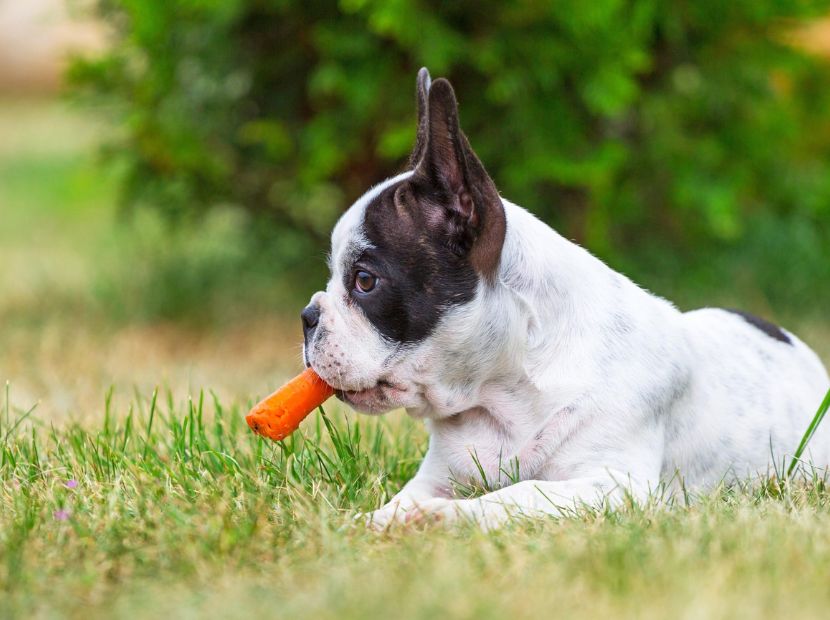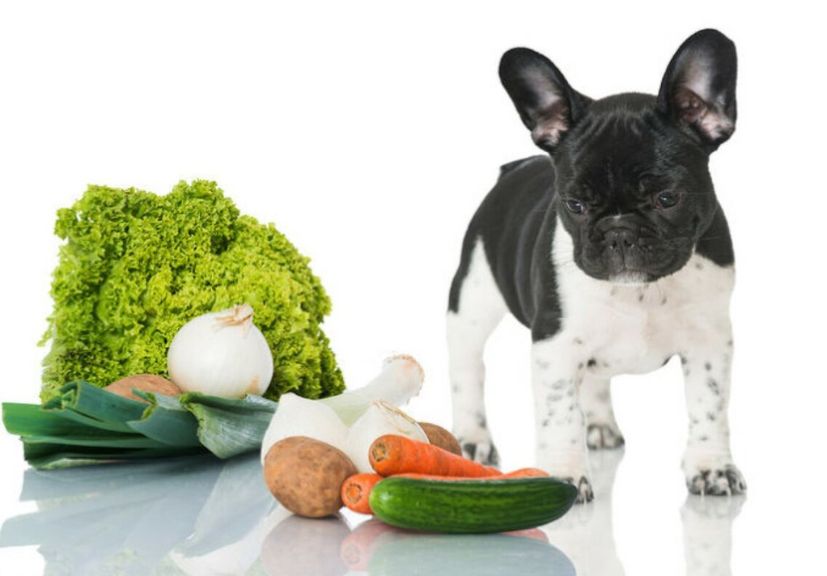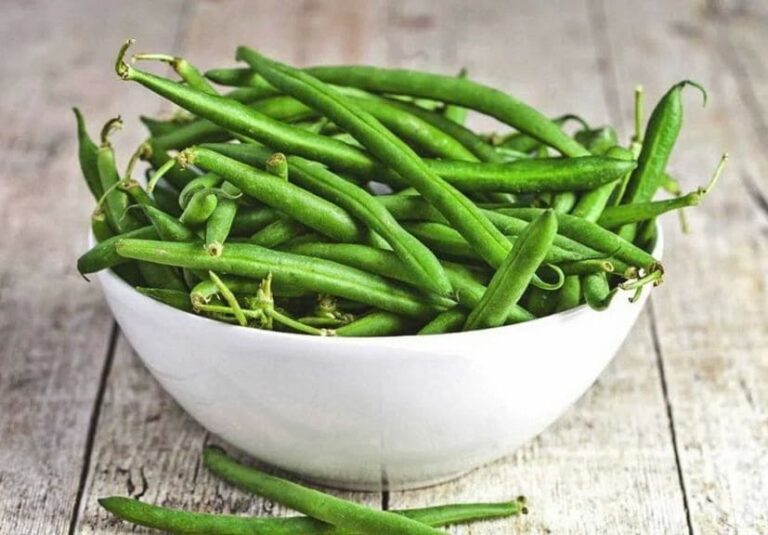Nutritional Needs of French Bulldogs
French Bulldogs, affectionately known as “Frenchies,” have unique dietary needs that must be carefully managed due to their small size, tendency towards obesity, and common food allergies. Their diet should be rich in high-quality protein, moderate in fats, and low in carbohydrates, with a significant focus on nutrient-dense foods. This is where vegetables come into play.
Vegetables are an excellent addition to your Frenchie’s diet, providing essential fiber, vitamins, minerals, and antioxidants that contribute to overall health. They help maintain a balanced diet by adding bulk and nutrients without the excess calories that can lead to weight gain—a common issue in French Bulldogs. Additionally, the fiber in vegetables aids in digestion, helping to prevent constipation and promoting regular bowel movements.
Top French Bulldogs Vegetables
When choosing vegetables for your French Bulldog, it’s important to select ones that are safe, non-toxic, and beneficial to their health. Here are some of the best options:
Carrots

Carrots are a fantastic vegetable for French Bulldogs. They are rich in beta-carotene, converted into vitamin A in the body and essential for maintaining good vision, a healthy immune system, and skin health. Carrots are also high in fiber, making them great for digestion.
You can serve carrots raw as a crunchy snack, which can also help in keeping your Frenchie’s teeth clean. Alternatively, you can steam or cook them to make them easier to digest. Just cut them into small pieces to prevent choking, especially if serving them raw.
Green Beans
Green beans are another excellent choice, particularly if your Frenchie needs to shed a few pounds. They are low in calories but high in fiber and vitamin K, which supports bone health. Green beans can be served steamed or fresh, making them a great addition to your dog’s regular meals or as a healthy treat.
Broccoli
Broccoli is packed with vitamin C, fiber, and powerful antioxidants that help fight off disease and keep your Frenchie’s immune system strong. However, it’s important to serve broccoli in moderation, as it can cause gas and bloating if given in large quantities. A few small, steamed or raw florets are all you need to give your Frenchie a nutritional boost.
Pumpkin
Pumpkin is a highly beneficial vegetable for French Bulldogs, particularly those with digestive issues. It’s rich in fiber, which aids in digestion and helps prevent diarrhea and constipation. Pumpkin also contains beta-carotene, which contributes to healthy eyes and skin. Canned or fresh pumpkin (without added sugar or spices) are excellent options. Start with a small amount and gradually increase as needed.
Sweet Potatoes
Sweet potatoes are another great source of fiber and vitamin A. They are easily digestible and can be served cooked and mashed as part of your Frenchie’s meal. Sweet potatoes are particularly beneficial for dogs with sensitive stomachs or food allergies, as they are less likely to irritate.
Spinach

Spinach is loaded with iron, calcium, and antioxidants, making it a powerful vegetable for supporting overall health. However, it should be given in moderation due to its oxalate content, which can interfere with calcium absorption and lead to kidney issues if consumed in large quantities. A small handful of steamed spinach mixed into your dog’s food is plenty.
Vegetables to Avoid
While many vegetables are safe for French Bulldogs, some should be avoided due to their toxicity or potential to cause harm.
Onions and Garlic
Onions and garlic contain thiosulfate, which is toxic to dogs and can cause hemolytic anemia. This can lead to symptoms like vomiting, weakness, and lethargy. Even small amounts can be dangerous, so it’s best to avoid them entirely.
Mushrooms
While store-bought mushrooms are generally safe, wild mushrooms can be extremely toxic and even deadly to dogs. It’s best to err on the side of caution and avoid feeding mushrooms to your Frenchie.
Tomatoes (in large quantities)
Tomatoes contain solanine, a substance found in the stems and leaves, which can be toxic to dogs if consumed in large quantities. While ripe tomatoes are generally safe in small amounts, it is best to avoid green or unripe tomatoes altogether.
Corn on the Cob
Corn itself isn’t toxic, but the cob poses a significant choking hazard and can cause intestinal blockages, which may require surgical intervention. If you want to give your Frenchie corn, ensure it’s off the cob and served in small quantities.
How to Introduce Vegetables to Your Frenchie’s Diet
Introducing vegetables into your Frenchie’s diet should be done gradually to avoid any digestive upset. Add a small amount of one vegetable at a time to see how your dog reacts. Monitor for any signs of allergies or digestive issues, such as vomiting, diarrhea, or changes in stool consistency.
Balancing vegetables with other components of your dog’s diet is also important. Vegetables should complement, not replace, high-quality proteins and fats essential for your Frenchie’s health. You can serve vegetables as a side dish, mix them into your dog’s regular food, or use them as low-calorie treats throughout the day.
Preparing Vegetables for Your French Bulldog
When preparing vegetables for your French Bulldog, always use safe cooking methods such as steaming, boiling, or pureeing. These methods help soften the vegetables, making them easier to digest while preserving their nutritional content. Avoid adding salt, sugar, or seasonings, as these can harm your dog.
Serving sizes should be adjusted based on your Frenchie’s size, weight, and activity level. A small handful of vegetables per meal is usually sufficient for a medium-sized French Bulldog. Be mindful of the total calorie intake to avoid overfeeding, especially if your dog is prone to weight gain.
Benefits of Vegetables for French Bulldogs
Adding vegetables to your Frenchie’s diet offers a wide range of benefits:
Enhanced Digestion
The fiber in vegetables promotes healthy digestion, helps regulate bowel movements, and can prevent constipation. This is particularly important for French bulldogs, who are prone to digestive issues.
Better Weight Management
Vegetables are low in calories and high in nutrients, making them an excellent choice for weight management. They help your dog feel full and satisfied without the extra calories that can contribute to obesity.
Improved Skin and Coat Health
Many vegetables contain vitamins and antioxidants, contributing to healthier skin and a shinier coat. For example, the beta-carotene in carrots and pumpkins supports skin health, while the vitamin C in broccoli helps maintain collagen production.
Boosting the Immune System
The antioxidants in vegetables like broccoli and spinach help strengthen your Frenchie’s immune system, protecting them from illness and promoting overall well-being.
Signs Your French Bulldog Enjoys Vegetables
Not all dogs will take to vegetables immediately, but there are signs that your Frenchie may enjoy them. If your dog eagerly eats the veggies you offer, wags their tail, or shows excitement at mealtime, these are good indications that they’re enjoying their new treats.
Additionally, you might notice improvements in their health, such as a shinier coat, more energy, or better digestion. Keep introducing a variety of vegetables to keep your Frenchie interested and prevent them from getting bored with their diet.
Conclusion
Incorporating vegetables into your French Bulldog’s diet is a simple and effective way to boost their overall health. With careful selection, proper preparation, and mindful portioning, vegetables can provide essential nutrients, aid digestion, and contribute to your Frenchie’s long, healthy life. As always, consult with your veterinarian before making significant changes to your dog’s diet, especially if they have existing health conditions. If you have information that you think we must add to our blog, do not hesitate to contact PetJazeera!
Common Questions About French Bulldogs and Vegetables
Can French Bulldogs Eat Raw Vegetables?
French Bulldogs can eat certain raw vegetables like carrots and green beans. However, some vegetables are easier to digest when cooked, so it’s best to try both methods and see what works best for your dog.
How Often Should Vegetables Be Given?
Vegetables can be given daily as part of your dog’s regular meals or treats. Just be sure to adjust portion sizes to avoid overfeeding.
What If My Frenchie Doesn’t Like Vegetables?
If your Frenchie is reluctant to eat vegetables, try mixing them into their regular food or offering them in a different form, such as pureed or finely chopped. You can also try different vegetables to find one your dog enjoys.




